- dairy farmers, corn farmers
- automotive & airplane manufacturing subsidies

| SUBSIDIES
- dairy farmers, corn farmers - automotive & airplane manufacturing subsidies |
 |
last updated 2022 March 16th
"Subsidies don't increase
competitiveness. If they did, the most competitive economy in history
would have been the Soviet Union, where all businesses were 100% subsidized;
and the most competitive businesses here would be state corporations.
Pierre Lemieux, Financial
Post, February 26, 2003
| LEARNING
OBJECTIVES |
When you are
reading the material for this section, pay careful attention to the way
that subsidies are effected by circumstances of the Competitive Environment
and the Political / Legal / Regulatory Environment - particularly the rulings
of the WTO and analysis by the OECD.
The purpose of this unit
is to explain
|
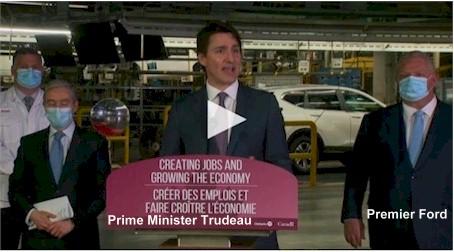 |
March 2022
Provincial and
$260 million to retool its
facilities to build hybrids and EVs
|
 |
Jan 2013
Provincial and
$34 million TMMCI = Toyota
|

| Jan 2013
Prime Minister Harper and Premier McGuinty did a photo-op at the Lexus plant of Toyota in Cambridge Purpose - to announce that the federal and provincial govt are giving $34 million to Toyota to contribute to building a hybrid car. "For Ontario, this is business as usual. Governments in this province — Conservative, Liberal or New Democrat — have long been in the business of subsidizing business." said Thomas Walkom in the Toronto Star Jan 23rd Walkom explains "In the case
of auto subsidies, governments argue they have no choice. Manufacturers
in general and car companies in particular are adept at playing off jurisdictions
against one another when deciding where to locate their plants — plants
which usually offer good, well-paying jobs."
|
. | Gov't subsidy
of auto production

original photo by Geoff Robins / Reuters And ... of course there is the "photo op" of the politicians making the announcement - which reinforces among the electorate that they are doing this to create jobs - and job creation is a major factor in politicians getting elected and re-elected. Summary
|
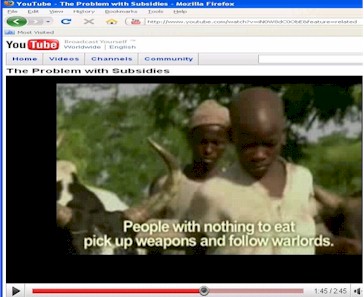 |
Titled "The Problem with
Subsidies", this YouTube video discusses how subsidies for American
agri-products make it difficult for African farmers to sell their agri-products
at a competitive price - which in turn jeporadizes peace in the local regions
when you have large numbers of people with no money and no food.
(shown in class 2009 and 2010) youtube.com/watch?v=iN0W8dC0ObE&feature=related This clip was produced by a group "Global Development Matters" which was raising issues with the 2008 U.S. presidential candidates. Global Development Matters is a project of the Center for Global Development (CGD), an independent, nonprofit think tank in Washington. |

| Why
do bananas
have to be a low price? |
UTSC
student Natalie S. in MGTC44 in early June 2010 emailed to comment on how
the video we watched in class about subsidies made her think about that
circumstance when she was shopping, and found some "out of season" produce.
Natalie explains
Natalie goes further to add
|
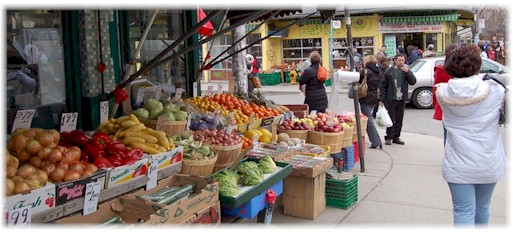 |
Photo by WTGR
April 2008 showing "out of season" fruits and vegetables imported from around the world, and sold at very low prices. |
 |
Why
do bananas have to be a low price?
WTGR responds to Natalie's comments / analysis "Thanks for sharing your story Natalie, I had a similar "eye opening" experience in the cold sping of 2008 when my wife and I were browsing the fruit and vegetable shops in Kengsington Market (photo above). Was amazed at the collection of produce from Latin American countries - and all at very low prices. When I was a child growing up on a farm in the late 1960's, early 1970's we had raspberries and strawberries in the summer - and that's it - we only had those fruits in the winter if it was in jam or frozen to then make a pie. Now I can go to Zehr's and buy a bunch for $2.99 anytime of the year from Mexico. Some people think this is great, but it won't take many years before our Ontario farmers start to be displaced by these larger "12 month a year" suppliers from outside Canada - then what do the raspberry farmers do, .... do they all switch to being website developers. i don't think so.." |
| Subsidies
and Canadian Farmers
an overview |
Excerpts from the article "The international pricing and subsidy system is so out of whack, according to figures compiled by Statistics Canada and the Organization for Economic Co-operation and Development, that it costs Canadian consumers and taxpayers more to keep agriculture alive in this country than it would to pay farmers to do nothing. Between 1999 and 2002, for example, Canadian farmers received support, in the form of either artificially inflated prices or direct subsidies, to the tune of $24.9 billion. Yet, over the same period, after all costs were accounted for, these same farmers made only $8.8 billion in net income. In strict economic terms, that means it would have been cheaper for Canadians to buy all of their food abroad (where it is subsidized even more handsomely by foreigners) and pay domestic farmers just to sit on their hands." "Even dairy farmers, who operate within a government-sanctioned cartel, have been affected. They're not able to get good prices for their so-called culls — cows that have been literally milked dry and are destined for the slaughterhouse. In the cities, none of this is evident. Groceries aren't cheaper. But in the Ontario countryside, people talk of little else. Reaction to the crisis ranges from chippy defiance in the marginal homesteads of Eastern Ontario to calculated resignation in the fat farmlands of the southwest. Some farmers march on Queen's Park demanding aid." "... critics are asking if agriculture in the traditional Canadian sense — producing standard bulk commodities for export — has a future. Alfons Weersink, an agricultural economist at the University of Guelph, points out that new, fertile areas in countries such as Brazil produce yields that Canada cannot match. Brazil is now the world's number one exporter of feed corn, soybeans, beef and pork — and is one of the main reasons why commodity prices globally are so low. "We always thought we could compete with the U.S. and Europe if there were a level playing field," Weersink says. "But can we compete with the Brazils of the world in producing, say, number two yellow corn? I'm not sure we can. We may have to do something different." In some countries, he says, farmers are no longer being subsidized to grow crops. They are being subsidized to farm in a certain way. Switzerland, for example, pays farmers to hang bells around the necks of their cows and graze them on mountainsides. This is considered a tourist attraction. In the U.S., farmers are explicitly paid not to grow certain crops." "Weersink says the real answer for Canadian farmers is to change their way of thinking. Currently, Canadian farmers tend to produce bulk commodities, put them on the world market and see what happens. Instead, he says, they should find out what final consumers want and produce more finished commodities to fit these demands. If consumers don't want to eat genetically modified crops, for instance, producers shouldn't waste their time complaining that city dwellers are unscientific. They should produce crops that are not genetically modified." "...Gordon and Bernice Gross have a 200-hectare farm just west of Blyth. He's the fourth generation of his family on this farm; his son is taking over. They had beef cattle, but got rid of them in 2003 when the border closed.... their farmland is planted partly in soybeans that are not genetically modified. Why? Because the Grosses sell all of their so-called identity preserved beans to a Japanese buyer whose consumers do not want to eat genetically engineered food. They get a better price and a guaranteed market." |
Key
Points
 |
According to many of the
basic
trade theories - we should trade in the things in which we have a natural
advantage.
In Canada we have distinct climatic advantages, soil and topographical advantages and human resource advantages to producing certain foods, like wheat, potatoes, beef, maple syrup, etc. As a person who was raised on a farm in southern Ontario in the 1970's, the question I want to ask is, if, economically, it doesn't make sense for Canadian farmers to try to compete, and produce food to sell to Canadians, then should we just let all our farmland go to waste - especially when millions in the world are starving to death. This doesn't make sense. Canada has millions of acres of great farmland which would be the envy of other countries who have food shortages, like India, and China - but according to the argument presented by Walkom, it seems like we should give this up? WTGR |
| Comparitive
Advantage
re: red carrots?  |
UTSC
student Shawn T. in MGTC44 in May 2010 emailed to suggest that a current
situation involving farmers in the "Holland Marsh" north of Toronto may
be an example of a decision that runs contrary to the "theory of Absolute
Advantage" and shows how a situation can develop where the producing country
has a slight Comparitive Advantage.
Shawn explains
|
Comparitive
Advantage re: red carrots?
 |
Shawn adds
In the ad it mentioned Indian red carrots. I thought it was really interesting because on the one hand there is the idea that a country that grows it's own food is sustainable, but on the other hand there is trade theory that you discussed which states that countries should produce what they are naturally good at producing. Not only is Canada trying to compete where they don't have an advantage but they are investing in going against nature and create seeds that can thrive in an environment that isn't natural itself in the name of sustainability. |
| Shawn concludes I figured it was worth mentioning because it just seemed downright strange to me that there is such a promotion for it. |

| WTGR replies I think what you queried Shawn is a good example of how the infleunces of the Technological environment and the Social-cultural environment can result in a situation that does not fit accepted theory. Technology through advanced farming practices (chemicals to stimulate growth and technology for water irrigation) together with new food demands created by immigrant communities, result in producers moving away from traditional products in order to satisfy the possibility of a new market. |
| story Tuesday, September 24, 2002 |
| . "Ottawa to appeal WTO
ruling on milk exports"
An example of subsidies, reported in a national newspaper, is the current situation on Canadian subsidies of the dairy industry - which effect our competitiveness in exporting milk products. "The federal government is appealing a World Trade Organization ruling that Canada's milk export system breaches international rules. The dispute goes back to March, 1998, when the United States and New Zealand launched a formal complaint, arguing that Canadian dairy products benefited from export subsidies. The WTO ruled in 1999 in favour of the two countries. Since then, Canada has made extensive changes, to conform with international obligations, Trade Minister Pierre Pettigrew said yesterday. Despite that, the two countries have continued to press their case. Last December, [2001] the WTO's appellate body ruled the two had failed to prove their case. But after a second review, a WTO panel ruled in July [2002] that Canada's dairy exports are unfairly subsidized" |
| 04 Dec 2001
The Toronto Star |
"A WTO appeal body in Geneva [Dec 2001] overturned a ruling last July [2000] which had concluded Canadian exporters unfairly benefit from aid to the country's dairy producers. If the original ruling had been upheld, the United States and New Zealand would have been allowed to levy more than $1 billion (U.S.) in trade sanctions against Canada.." |
Key
Points
 |
The purpose of discussing
stories like the Dairy subsidy is to bring these issues down to a level
where the everyday person can understand the impact of these circumstances
on a personal level. If the Dairy Appeal had NOT been successful, many
small and medium sized Canadian companies selling stuff to the States would
find it competitively difficult because the price of their products would
have to be increased due to the resulting tariffs the Americans would enact.
WTGR |
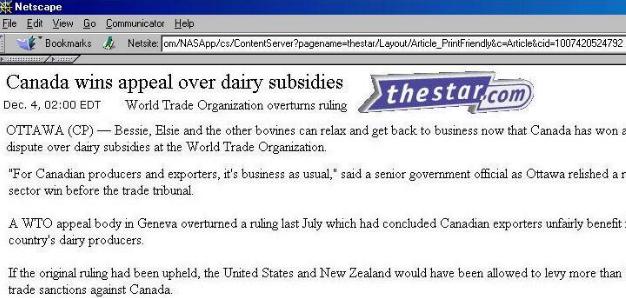
| "The case called into question whether any government can maintain a regulated domestic market for agricultural products without violating international trade rules. The key issue focused on whether domestic marketing boards, by their very existence, constitute an export subsidy. Yesterday's [Dec 2001] decision appears to give Canada legal grounds to fight future challenges to its supply management system, said a senior government official who spoke on condition of anonymity." |
Key
Points
 |
Subsidies are
still a sensitive issue in Canada since we still have a significant number
of members of parliament elected from rural ridings - which means elected
by farmers. Subsidies are government support for many things but often
it is most "political" when it regards agricultural products.
In Canada, despite the growth of immigration to Toronto, there are still a large number of Canadian living and working on farms in Western Canada and rural Ontario and rural Quebec. The products from these farms are expensive to produce at a competitive cost and therefore the provincial and federal governments have many programs to support the farmers. The dairy industry is a big
industry in Canada - to know more about this, read the federal government's
brief
|
Key
Points
 |
The dairy industry
in Canada is very big in Quebec, and also in Ontario and many Quebec federal
politicians feel a lot of pressure to support the dairy farmers.
WTGR |
| "Dairy Farmers
Subsidies Illegal: WTO"
was a June 2002 story in the Financial Post section of the National Post written by Ian Jack the story covered the WTO ruling June 24th, 2002, that the Canadian government is illegally subsidizing dairy farmers. "The decision, if is stands, will force the government and industry to revisit the quota system... about $200 million in exports are effected" "IN a case that goes back to 1988, [N.Z. and U.S.A.] argued that Canada's complex pricing system in fact allows exports at a lower price than domestic milk and cheese. A WTO panel ruled against Canada in 1999 and a year later Ottawa introduced changes it said fixed the problems. No they didn't says New Zealand and the United States and a second case [against Canada] was launched. They again defeated Canada but and appeal panel said there wasn't enough evidence one way or the other" |
| . | It is interesting to hear the other person's view. Below is information about New Zealand's opinion of Canada. |
 |
"Canada's de facto export subsidies cost New Zealand about $80 million a year because of their depressing effect on world dairy prices. That's more than $5500 per year for each New Zealand dairy farmer.' |
| Mr. Sutton's remarks were
made at a time when New Zealand and the USA took Canada to the WTO re:
dairy subsidies
www.tradenz.govt.nz/CWS/page_Article/0,1300,2180%252D1887,00.html New Zealand says
"The current dispute concerns
a replacement dairy export scheme the Canadians devised to replace a scheme
already ruled illegal by the WTO in 1999. A disputes panel ruled
in favour of the challenge to the scheme by New Zealand and the United
States earlier this year [2001]."
|
| Key Points | The Automotive
industry can be argued to be the largest industry in Canada - which in
turn "drives" many other industries, eg. steel manufacturing, aluminium,
electrical, financial, trucking, etc. There is not "Canadian" car maker,
the players are the BIG THREE American manufacturers + Toyota makes cars
in Cambridge, Ontario, Honda has a plant in Alliston, and GM & Suzuki
have a Joint Venture in Ingersoll Ont.
The Americans understand
the big role that automotive manufacturing plays in the economy of Ontario
and from time to time try to squeeze the provincial and federal government
in to providing subsidies.
|
| Automotive
Manufacturing Subsidies 
Automotive Manufacturing Subsidies |
Automotive
Manufacturing Subsidies
was a February 2003 in the Financial Post section of the National Post written by Pierre Lemieux "Ford wants $250-million from the provincial and federal governments to build a plant in Oakville, Ont. Why not? Nearly everybody else has his hands deep in the public treasury. DaimlerChrysler is lobbying for $400-million to build a plant in Windsor, Ont." "The problem is that subsidy money is not manna from heaven. What Ford's Jim Padilla calls "being competitive" when he lobbies the Ontario government for subsidies means competitiveness in bilking the taxpayer." "Subsidies don't increase competitiveness. If they did, the most competitive economy in history would have been the Soviet Union, where all businesses were 100% subsidized; and the most competitive businesses here would be state corporations." "If Ford and DaimlerChrysler succeed in looting the public treasury, the taxpayer will obviously lose, but who would gain?...Canadian car purchasers will get virtually no benefit from subsidies to manufacturers, because a large part of Canadian international trade in cars is free trade and car prices are not determined in Canada." "Economic analysis of special-interest politics also explains why large domestic companies get a disproportionate share of government subsidies. Ford and DaimlerChrysler are not the only examples: Nearly 50% of Export Development Canada's $21-billion loan portfolio benefits aerospace (predominantly Bombardier) and IT (mainly Nortel). If the purpose of business subsides was really to create jobs, they would go to small businesses, which do more job creation than large corporations." |
.
| Subsidies
in the U.S. effecting
Canadian
and
|
The topic of
subsidies is obviously something that depends upon which side you stand.
If you are a producer, you will argue that you need subsidies, to some
degree, because other parts of the world do things too cheaply, which means
if you have to compete directly, you'll be selling your product for a price
too high.
So producers use various arguments to convince the government to protect them so they can keep their costs reasonably low and sell their product at a price which makes it possible to keep producing. Manufacturers, on the other hand, always want to cut costs - even from the suppliers in their own country. Cutting costs means trying to squeeze producers to sell for less, or find other sources that are cheaper. |
| Corn
Subsidies
U.S. 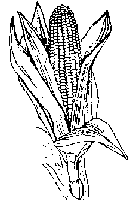 |
The National
Post reported in April 2006 that
"Canadian Corn Farmers Protest U.S. Subsidies" Canadian corn producers (farmers of corn) say they are having a hard time selling corn at low prices to Canadian customers because the U.S. farmers are selling corn into Canada at lower prices. The Canadian farmers claim that the U.S. farmers receive heavy U.S. government support in the form of subsidies and additionally, U.S. corn producers are selling corn in Canada for a price lower than in the U.S. - which is technically the definition of dumping. Canadian users of corn - such as pet food manufacturers and corn processors that make corn starch, like Casco Inc. say that they want the Canadian government to cut tariffs on U.S. corn so they can obtain this resource at lower prices. The Canadian corn producers want to maintain the levy on imported U.S. corn. CBSA - Canada Border Services Agency www.cbsa-asfc.gc.ca is the Canadian federal ministry that rules on such tariffs. The CBSA takes many factors into account including rulings by other national and transnational agencies. CITT - the Canadian International
Trade Tribunal www.citt-tcce.gc.ca
ruled the levy on U.S. corn should be repealed.
The Pet Food Association of Canada said the CITT decision was good for their pet food producers because it allowed then to compete against U.S. rivals. |
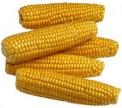 |
summary
So you have an interesting situation in which one group of Canadians want a tariff on incoming grain corn. Another group want the tariff removed - because, cheaper corn will allow them to make something with that corn at a competitive price, which they can export back to the U.S. |
Airplane
Manufacturing Subsidies
.
| Key Points |
. WTGR |
| "U.S. takes Airbus complaint
to WTO"
is the title of an Associated Press story carried in the Toronto Star Oct 2004 journalist Jeannine Aversa wrote "U.S. trade authorities said today [2004 Oct 12] they will file a complaint against the European Union to the World Trade Organization, contesting what they regard as billions of dollars in unfair subsidies provided to aircraft company Airbus by European governments." Aversa explained quoted U.S trade representative Robert Zoellick saying "This is about fair competition and a level playing field...since its creation 35 years ago, some have justified subsidies to Airbus as necessary to support an 'infant' industry. If that rationalization were ever valid its time has long passed. Airbus now sells more large civil aircraft than Boeing," Aversa says "The dispute involves two large aircraft companies — Boeing against Airbus. They compete in a wide range of civilian and military aircraft markets, and Airbus has over the past decade supplanted Boeing as the world's biggest aircraft manufacturer. The United States and EU agreed in 1992 on a deal which limited subsidies for the world's two largest airplane makers to 33 per cent of the production costs for new models." "Chicago-based Boeing has long been frustrated that France-based Airbus has continued to get government money to help it develop new planes such as the A380, even though it has become Boeing's commercial equal in recent years. Last year, Airbus delivered more planes than Boeing for the first time and will do so again in 2005." |
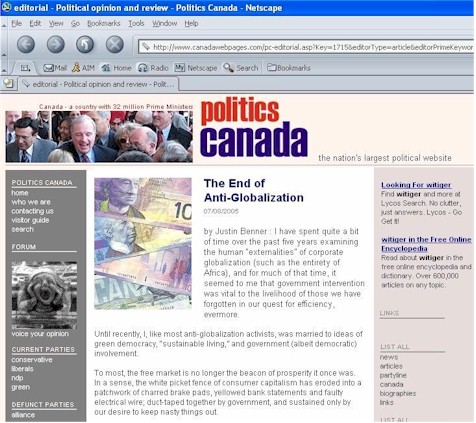 |
This website on globalization includes reference to this unit on Subsidies on witiger.com |

|
|
CONTACT IMAIN PAGE I NEWS GALLERY I E-BIZ SHORTCUTS I INT'L BIZ SHORTCUTS I MKTG&BUSINESS SHORTCUTS I TEACHING SCHEDULE |
| . | |
| MISTAKES I TEXTS USED I IMAGES I RANK I DISCLAIMERI STUDENT CONTRIBUTORSI FORMER STUDENTS I | |
| . |